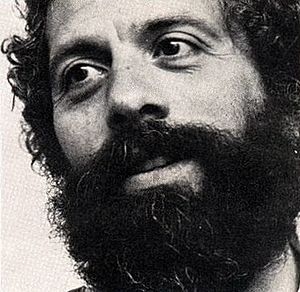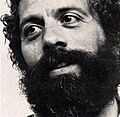Facundo Cabral facts for kids
Quick facts for kids
Facundo Cabral
|
|
|---|---|

Image of Agentinian singer Facundo Cabral from the album "Pateando tachos" in 1984
|
|
| Background information | |
| Birth name | Rodolfo Enrique Cabral Camiñas |
| Also known as | El Indio Gasparino |
| Born | May 22, 1937 La Plata, Buenos Aires, Argentina |
| Origin | La Plata, Argentina |
| Died | July 9, 2011 (aged 74) Guatemala City, Guatemala |
| Genres | Troubadour, folklore, folk rock, protest |
| Occupation(s) | Singer-songwriter, poet |
| Instruments | Vocals, guitar, harmonica |
| Years active | 1959–2011 |
| Labels | RCA Victor |
| Associated acts | Jorge Cafrune, Alberto Cortez |
Facundo Cabral (born Rodolfo Enrique Cabral Camiñas) (May 22, 1937 – July 9, 2011) was a famous Argentine singer and songwriter.
He was best known for writing songs like "No soy de aquí ni soy de allá" ("I'm not from here nor there") and "Pobrecito mi Patron" ("My Poor Boss"). Many other Spanish-speaking artists, such as Jorge Cafrune and Joan Manuel Serrat, have sung his songs. Facundo Cabral used his music and actions to speak out against military rulers in Latin America from the 1970s onwards. His songs often mixed spiritual ideas with calls for fairness and equality for everyone.
After traveling the world, Cabral became very popular in Argentina in the early 1980s. This was partly because Argentine radio stations played more local music after the Falklands War. He was loved across Latin America during his life and is still remembered today. In 1996, Facundo Cabral was named a UNESCO Messenger of Peace for his work promoting peace.
Biography of Facundo Cabral
Facundo Cabral was born Rodolfo Enrique Cabral Camiñas in La Plata, Argentina. He was one of seven children in a poor family. His father left the family shortly before Facundo was born, and they didn't meet again until Facundo was 46 years old. As a young child, Facundo couldn't speak until he was nine years old. He also couldn't read or write until he was 14.
Facundo later shared that he left home at age nine to find work for himself and his mother. He took on all sorts of jobs. His mother told him as he left, "This is the second, and last gift I can give you. The first was to give you life, and the second one, the freedom to live it." He traveled to Mar del Plata and worked odd jobs. As a young adult, he got a job cleaning a hotel. He often played guitar and sang there to pass the time or earn extra money. The hotel owner noticed him and gave him a chance to sing professionally.
In his early career, he used names like El Indio Gasparino before choosing Facundo Cabral. He performed in over 165 countries, and his songs were translated into many languages. Because he was seen as a rebellious artist and spoke out against military power, he had to leave Argentina after the military took over in 1976. He lived in Mexico and toured widely before returning home in the early 1980s.
Cabral was married twice. Sadly, his first wife and their one-year-old daughter died in a plane crash in 1978. This event deeply affected him for the rest of his life. His second wife, Silvia Pousa, was married to him for seven months before he passed away in Guatemala. Towards the end of his life, he had trouble seeing and moving around. He had also survived bone cancer many years before. He often spoke about his love for traveling, calling himself a "first-class vagabond." He often said he preferred a simple life, choosing happiness and spiritual clarity over wealth and comfort. These ideas were often part of his songs.
He shared his life's story through songs, poems, and interviews. One of his famous quotes was, "I always ask God, why did you give me so much? You gave me misery, hunger, happiness, struggle, lights... I saw everything. I know there is cancer, ... and spring, and apple fritters."
Facundo Cabral's Beliefs
Facundo Cabral said his spiritual ideas were shaped by many important figures. These included Jesus, Laozi, Zhuang Zhou, Rajneesh, Jiddu Krishnamurti, Gautama Buddha, Schopenhauer, John the Baptist, Francis of Assisi, Gandhi, and Mother Teresa. He believed in ideas like quantum mysticism and letting go of one's ego (self-importance).
He greatly admired the writings of Jorge Luis Borges, with whom he had deep talks, and Walt Whitman.
Most people believe Cabral never joined a specific political group. However, for many years, he promoted pacifism, which means believing in peace and solving problems without fighting. He often described himself as "violently pacifist" and a "first-class homeless person." In his later years, he partly agreed with the ideas of philosophical anarchism. This idea suggests that people should be free to make their own choices without too much government control, while still respecting others.
His Death
Facundo Cabral was shot and killed on July 9, 2011, during a tour in Guatemala City. He was on his way to La Aurora International Airport.
He had just left a hotel after a concert the night before. He was heading to the airport when gunmen attacked his car. He died in the car. This happened around 5:20 AM on a busy road that connects to the airport. Cabral had planned to take a hotel shuttle, but he accepted a ride from Henry Fariñas, a concert promoter.
Cabral was with his agent David Llanos and Henry Fariñas, who were both injured. Another car with bodyguards was following them, but they couldn't protect Cabral's vehicle from the attack. The car Cabral was in tried to escape by driving into a fire station. Investigators later found that the bullets seemed to be aimed at the driver, Henry Fariñas. This suggested the attack might have been related to problems Fariñas had with criminal groups. Three suspects were arrested.
At the time of his death, Cabral had been married for seven months to Silvia Pousa, a psychologist from Venezuela. She had been his partner for ten years. His body was flown to Argentina from Guatemala on July 12, 2011. His widow and nephew, along with officials, received his remains in Buenos Aires. An official brought a guitar and a small bag from the plane, which Cabral had said was all he needed for his constant singing tours.
His coffin was shown to the public at the Ateneo theater in Buenos Aires, where he had last performed in Argentina. Cabral's family thanked the media for their respectful coverage of his death. His body was taken to a cemetery about 32 kilometers (20 mi) north of Buenos Aires for cremation. This was a private ceremony with only family and close friends.
On March 13, 2012, authorities in Colombia announced the arrest of Alejandro Jiménez, also known as El Palidejo. He is believed to have ordered Cabral's murder.
Reactions to His Death
The President of Guatemala, Álvaro Colom, declared three days of national mourning, meaning a period of sadness for the whole country. Hundreds of Guatemalans gathered in the capital's Plaza de la Constitucion, singing Cabral's songs. Some signs carried by grieving Guatemalans said, "Argentina, we apologize," and "We ask forgiveness of the world for the assassination of Facundo."
Leaders, performers, and other important people from across the Americas spoke out against the murder. They demanded that Guatemalan authorities find justice. Rigoberta Menchú, who won the Nobel Peace Prize in 1992, went to the scene of the killing and cried. She said, "For me, Facundo Cabral is a master. He loved Guatemala greatly." She thought the attack might have been because of Cabral's beliefs.
Social media was filled with shock and anger. Ronalth Ochaeta, a former human rights official in Guatemala, wrote on Facebook, "I feel an immeasurable shame, a profound anger for my country." Rodolfo Ajquejay, President of the Association of Artists in Guatemala, said, "this is mourning at a global level because [he] left only positive messages in his songs."
Francisco Dall'Anese, head of the International Commission Against Impunity in Guatemala (CICIG), called the incident "regrettable" and "one more sign of the violence in Guatemala." Guatemala's human rights ombudsman, Sergio Morales, asked authorities to investigate the crime and not let it go unsolved.
Ecuadorian President Rafael Correa said, "Facundo Cabral will be immortalized with his songs." Bolivian Minister of Culture Elizabeth Salguero said Cabral's death was sad because "you can not understand that there are people who want to do much damage to a man who gave so much as a singer, composer, and poet." Venezuelan President Hugo Chavez also expressed his sadness, saying, "We are weeping with Argentina."
The Mayor of Lima, Peru, Susana Villaran, tweeted, "So ironic. A man who preached about peace and sang for life, dies in such a violent way." She shared one of his famous quotes: "If you love the money at most you'll get to a bank, but if you love life, God will surely come." Colombian President Juan Manuel Santos also mourned his death, calling it a "vile murder."
The United Nations released a statement strongly condemning the assassination. They said it was "painfully ironic that the one who toured Latin America with a message of justice, peace and fraternity lost his life in the hands of a group of assassins."
Eduardo Suger, a presidential candidate in Guatemala, called the attack "vile and shameful" for the country. He said, "I felt so much pain, I felt sad for Guatemala, because we are a people capable and honest, but now we paint as a people of thugs, it's embarrassing."
The head of the Organization of American States (OAS), Jose Miguel Insulza, called the murder an "irrational crime."
René Pérez, leader of the hip-hop group Calle 13, wrote, "Latin America is in mourning." Other famous pop musicians like Ricky Martin, Alejandro Sanz, and Ricardo Montaner also shared their sadness on Twitter.
Guatemalan artists honored Facundo Cabral on July 10, 2011, with a concert in Constitution Square. Many artists participated, including Armando Pineda and Ricardo Arjona. Ricardo Arjona wrote in a Guatemalan newspaper, "As a Guatemalan, I deeply regret the impact this news will generate among international opinion. As a friend and colleague, I will lament the absence of Facundo forever."
Vicente Serrano, a radio host, brought Cabral to Chicago for his last performance there. Serrano remembered how Cabral loved the Chicago skyline and the Art Institute of Chicago. "Facundo cried when we went to visit the Art Institute because he said he was moved by its beauty," Serrano said.
Argentine singer and poet Alberto Cortez, a close friend of Cabral, was heartbroken by the news. He remembered Cabral as a good friend who became a mystic, sharing his spiritual ideas with people who welcomed them.
Argentine television stations stopped their regular shows to report on the 74-year-old singer's death. The Argentine government declared three days of mourning. They remembered that he "devoted his life to singing, with their letters transmitting the spirit of peace inspired by the teachings of Jesus, Gandhi and Mother Teresa of Calcutta."
Other Famous Quotes
- "Every morning is good news, every child that is born is good news, every just man is good news, every singer is good news, because every singer is one less soldier."
- "I like the sun, Alice, and doves, a good cigar, a Spanish guitar, jumping walls, and opening windows, and when a woman cries. I like wine as much as flowers, and rabbits, but not tractors, homemade bread and Dolores' voice, and the sea wetting my feet. I like to always be lying on the sand, or chasing Manuela on a bicycle, or all the time to see the stars with Maria in the hayfield. I'm not from here, I'm not from there, I have no age, nor future, and being happy is my color of identity."
- "I'm amazed to form part of this amazing universe and I'm proud of the hunger that keeps me awake. Because when man is full he falls asleep."
- "May God want for man to be able to be a child again to understand that he is mistaken if he thinks he can find happiness with a checkbook."
- "I don't waste time taking care of myself. Life is beautiful danger. From the danger of love, my mother had seven kids. If she had guarded herself against my father and his fervor, a singer would be missing from tonight's meeting."
- "My poor boss thinks that I'm the poor one."
- "This is a new day to begin again, to look for the angel that appears in our dreams, to sing, to laugh, to be happy again. In this new day I will leave the mirror, and try to finally be a good man. I will walk with my face to the sun, and I will fly with the moon."
- "Forgive me Lord but sometimes I get tired of being a citizen. The city tires me, the offices, my family and the economy. Forgive me Lord, I am tired of this hell, this mediocre market where everyone has a price. Forgive me Lord but I will go with you through your mountains, your seas, and your rivers. Forgive me Lord but sometimes I think you have something better than this for me. Forgive me Lord, I don't want to be a citizen, I want to be a man, Lord, like you created me."
- "I am my own inventor because that is the task with which God has trusted me. God, or the Devil because they are the same thing. The Devil is a pseudonym that God uses when he has to create something of morally doubtful character, in order to not tarnish his good name, he uses the pseudonym."
- "The poor man that walks through this borrowed life without a song, in addition to being poor is a ghost, and in addition to being a ghost, is nothing."
- "We are crossing through life on the train of death seeing how progress is putting an end to people."
- "And God created woman and she said 'My Lord, if Mary conceived without sin, couldn't I sin without conceiving?'"
- "I stop in San Francisco where there's always something to hear, at least when Krishnamurti is nearby, he who knows that the fundamental revolution is to revolutionize one's self. I stop in Crete where there is always something to love."
- I raise my voice in Italy and I am silent in India, because I am and I live in the present, because I am made of dreams, of emptiness, of wine, and of wheat, they call me MAN. It's true that I am dust, but sacred dust I am, even though you know that when I say I am, I am saying you are, invincible, unnameable. Highest Lord, don't worry about our daily bread because that is up to us, that's why we are men, but don't leave us without our nightly dream because without it we are nothing, we who are perhaps only a dream that you dream."
- "If I am a thief, it's because of private property."
- "God has given you a human being to be in charge for, and this is yourself."
Images for kids
See also
 In Spanish: Facundo Cabral para niños
In Spanish: Facundo Cabral para niños
 | Jackie Robinson |
 | Jack Johnson |
 | Althea Gibson |
 | Arthur Ashe |
 | Muhammad Ali |




